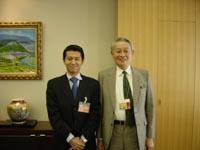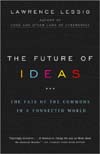
I am embarrassed to admin that I had scanned The Future of Ideas by Lawrence Lessig, but had not READ it carefully. I find I do this with books where I know the author's position quite well in an area I know something about. I KNOW that the book is worth reading, but it feels like patting myself on the back. I tend to like reading books written by the enemy. ;-) Anyway, enough lame excuses. Tomorrow, I have a magazine article discussion with Larry and the translator of The Future of Ideas Hiroo Yamagata, who as I've said before, is an intelligent, but ruthless fellow. Hiroo is a menace to those who are unprepared, but is probably one of the most thoughtful people in this space... Anyway, now that I finished the book, I am prepared for tomorrow...
So about the book... everyone has probably read it already so I probably don't need to write a lame book review, but if you haven't read it, I can now urge you to read it. Larry talks about spectrum, code, and content control and calls them the physical, code and content layers. This is exactly how I think of these issues and how everyone should think of these issues. Although he addressed it in his last book, Code, Larry doesn't have time to talk about privacy in this book. I believe that identity and privacy are also important and probably represent for me the other BIG issue.
I had thought through most of these issues already in great detail so the logic was easy to follow and the detail and facts have added new ammunition to my arsenal. What was also interesting was Larry's continued pursuit of balance both politically and technically. When you are under public scrutiny, balance is very important to protect being attacked by people you are trying to change. The difficulty of taking a balanced view is that the message is difficult to deliver, you can sound wishy/washy and at the end of the day, you will end up being attacked by both extremes, the moderates apathetically fading into the background. Or at least that is my experience.
Maybe it's because Larry is a law professor, but he is able to navigate the detail and the logic well... But as the issues become more and more complex and one realizes that the government and public opinion become more and more obtuse, one ends up becoming VERY despressed as Larry appears to be by the end of the book.
I think Larry's mission, shared by most of the intelligent people that I know is one of the most important missions today. The commons and innovation are threatened by the old power structures which are more and more able to stay in power than ever before. I believe that a similar struggle is going on in the field of energy technology. Big oil protecting its interests and waging war.
Innovation in information technology and energy (See ECD) has the power to solve many of the problems we face today, yet this innovation is faced with great resistance. The public, which at the end of the day is the only group capable of causing real change, sits watching apathetically. How depressing.
![Joi Ito [logo]](/_site/img/joi-ito-logo-300.png)





 So yesterday's discussion with Hiroo Yamagata and Lawrence Lessig went well. It was a lot of fun and I think a constructive discussion. Hiroo was in good form. But he usually is... in person. ;-) He had written something negative about Mr. Ikeda in the afterward of translation of "The Future of Ideas" and had gotten in a dispute with Mr. Ikeda. He had just finished the battle and I guess they have both gotten over it now. Maybe Hiroo was just tired from that. I do generally agree with Hiroo's position, although maybe not the way he said it. I think Mr. Ikeda and others had inferred that Larry was against privacy policies. In a mailing list Mr. Ikeda had said that my efforts to stop the National ID were futile and that we didn't have any privacy anyway. The struggle for privacy is a struggle of data structures and can be achieved without destroying the end-to-end nature of the Net. It think it is simplistic to equate privacy with control of the Net. I just finished reading Hiroo's English translation of his afterward. It's quite good. He should post it on the Net.
So yesterday's discussion with Hiroo Yamagata and Lawrence Lessig went well. It was a lot of fun and I think a constructive discussion. Hiroo was in good form. But he usually is... in person. ;-) He had written something negative about Mr. Ikeda in the afterward of translation of "The Future of Ideas" and had gotten in a dispute with Mr. Ikeda. He had just finished the battle and I guess they have both gotten over it now. Maybe Hiroo was just tired from that. I do generally agree with Hiroo's position, although maybe not the way he said it. I think Mr. Ikeda and others had inferred that Larry was against privacy policies. In a mailing list Mr. Ikeda had said that my efforts to stop the National ID were futile and that we didn't have any privacy anyway. The struggle for privacy is a struggle of data structures and can be achieved without destroying the end-to-end nature of the Net. It think it is simplistic to equate privacy with control of the Net. I just finished reading Hiroo's English translation of his afterward. It's quite good. He should post it on the Net. Had the Lessig's, Jiro Kokuryo, Sen, Yoon and Neeraj over for Thanksgivings Dinner. Didn't cook the turkey ourselves this year so it wasn't a REAL Thanksgivings, but it was better than no turkey.
Had the Lessig's, Jiro Kokuryo, Sen, Yoon and Neeraj over for Thanksgivings Dinner. Didn't cook the turkey ourselves this year so it wasn't a REAL Thanksgivings, but it was better than no turkey.

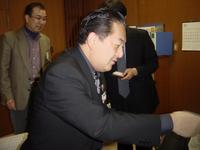
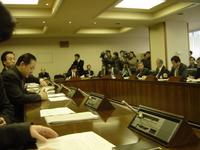


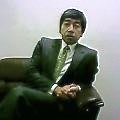












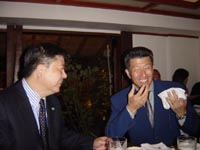













 I just LOVE
I just LOVE 

 Nooo! Stop! Pleeeeez.... Not so soon... I feel like a little kid playing with my blocks and hearing my mean big brother come home to dash my little castle to bits...
Nooo! Stop! Pleeeeez.... Not so soon... I feel like a little kid playing with my blocks and hearing my mean big brother come home to dash my little castle to bits...


